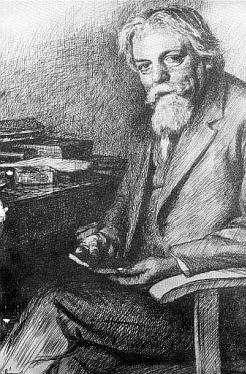5 April 2011
The teaching activity of the founder of Czech Egyptology, František Lexa, at the Charles University Faculty of Arts
April marks 92 years since František Lexa, a freshly appointed private assistant professor of Egyptology at Charles University, first stood before the students of the Faculty of Arts shortly after his 43rd birthday and launched Egyptology courses taught in the Czech language.
|
He was born on April 5, 1876 in Pardubice into the family of a local lawyer but grew up in Prague. During his studies at the Faculty of Arts he trained to become a high school professor of mathematics and physics but also attended a philosophy seminar taught by Professor Masaryk. Shortly after graduation he acquired a permanent position at the secondary grammar school in Hradec Králové and decided to qualify as a private assistant professor of psychology. His thesis concentrated on the origin and psychology of writing systems, so Lexa decided to study all writing systems known at that time, starting with the Egyptian hieroglyphs. Lexa’s attempts at translations from the Egyptian language caught the attention of Rudolf Dvořák, a professor of oriental philology, who helped Lexa gain a three-semester scholarship to study Egyptology in Berlin and Strasbourg. There he began working on his thesis, but the war interrupted the process and Lexa qualified as a university lecturer as late as the start of 1919. |
|
Lexa was appointed regular professor of Egyptology in 1927 and for some time he was the sole person responsible for the whole Egyptology course. As of the summer semester of 1929/30 he was joined by Jaroslav Černý, who had just been appointed private assistant professor. Lexa was thus able to concentrate in his lectures mainly on the later stages of the old Egyptian language, i.e. the Demotic and Coptic languages. His Demotic lectures were especially significant as after 1934 Prague was for some time the only European city where it was taught and Lexa was therefore instrumental in maintaining the continuity of Demotic studies in Europe. Demotic studies repeatedly attracted the Italian Egyptologist Giuseppe Botti, later professor at the Florence and Rome universities, to Prague in the 1930s.
Besides teaching, Lexa was also involved in managerial work – in the academic year 1934/35 he was Dean of the Charles University Faculty of Arts. He continued lecturing until the closure of Czech universities in the autumn of 1939; in the following year he was officially pensioned. When universities reopened in 1945, Lexa returned to teaching at the Faculty of Arts – one of his students was his later successor Zbyněk Žába (1917–1971). After his return from England, Jaroslav Černý again participated in the teaching. There were plans for an Egyptology chair to be established for him at the Masaryk University in Brno, but he was eventually called back to become a professor of Egyptology at the University College London.
Lexa himself gave lectures until 1958. Shortly before that at the celebration of his 80th birthday he summarized his teaching career in a few words that remain relevant to this day: “As I know more today than my predecessors once knew, those coming after me already know more in certain fields than I do, and in the future they will complete more work and better work than I have done. If it weren’t the case, it would be my fault. It would prove that I was a bad teacher even though I did try hard.”
You can find more information on the personality of Prof. Lexa in the e-publication František Lexa, founder of Czech Egyptology.
Prof. PhDr. Ladislav Bareš, CSc., ředitel Českého egyptologického ústavu FF UK

